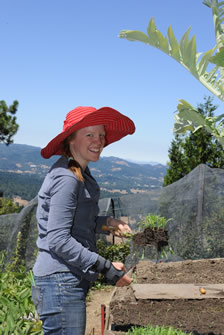Rachel Britten, Golden Rule Mini-Farm Co-Field Coordinator
“You’re a farmer and you cook because you’re an activist,” pronounced a professor of mine, long into my journey into agriculture. Activist, I thought. Hmmm. I was reluctant to accept the title. I grew up amidst the monoculture-dominated agricultural systems of Iowa. By the time I was born, my parents had long since sold their share of the family farm, and I constantly teased them about depriving me of a farming lifestyle. As a Grow Biointensive (GB) teacher at a recent 3-day workshop said, “I like the old things.” I like families around a big table, the smell of lilacs in the summer, gingham aprons, canning, living on little, hospitality and hands in the dirt. The charm and promise of this lifestyle led me to farming. What has kept me in this field, however, is an even deeper conviction: that sustainable agriculture—and more specifically, GB—has what it takes to change the world. It has the capacity to radically change the way humans interact with and impact the environment and each other. My introduction to John Jeavons was during my first year managing a market garden for a small farm on the Olympic Peninsula in Washington State. I was terrified at the prospect of my new responsibilities. I remember a local farmer describing her new apprentice to me, saying: “She’s never even seen kale growing in the field.” Geez, I thought to myself: a year ago, neither had I! In this moment of terror, my hard-working farming mentor handed me a copy of How to Grow More Vegetables. To this day, I greatly credit the fast learning curve facilitated by the book for my success that year. A few years later, I had the pleasure of visiting Ecology Action with Evergreen State College, while working on my Agro-ecology degree. It’s possible I did not sit down from the time I noticed John Jeavon’s name on our field trip itinerary, to weeks later when we actually visited EA. I was thrilled. A part of the course was diagramming energy flows and nutrient cycling for every farm that we visited. Curious and skeptical, it did not take long to notice that GB is different. Weird, I thought, these nutrients actually cycle through the system. And not just nitrogen or micronutrients; carbon cycles through this system. I was hooked! Grow Biointensive was doing something remarkably innovative: pursuing real, quantifiable sustainability. When I came back to EA two years later as a teacher’s aide for the Evergreen State College course, it was a no-brainer to tuck my resumé in my field notebook in hopes of pursuing work with this inspiring method of farming. Today, here I am, as proud as ever to help manage the Golden Rule Mini-Farm on this beautiful land owned by an established intentional community. It is this awe and joy that imbues me with the strong conviction in this farming method. It is not enough to grow a carrot without chemical fertilizer and herbicides, or even a carbon-neutral carrot: we must change ourselves. In this agricultural work we are doing, we activate a lifestyle. Our delights are in a big harvest and a lovingly cooked meal, time together as staff, and a well-stocked shelf of preserved garden bounty. Our farming method is different, but so is our lifestyle, and perhaps most inspiring of all is the knowing that when we live happily without robbing inputs from other locations, we intentionally leave the space and resources for others to do the same. Farming like this has the power to change the soil and the power to change us as humans, to inspire us to shift our priorities. This is cultural change. Which, I suppose, is a pretty radical belief. Maybe I farm and cook because I am an activist, after all!
top | Newsletter Home | Article Index | Archive
|




